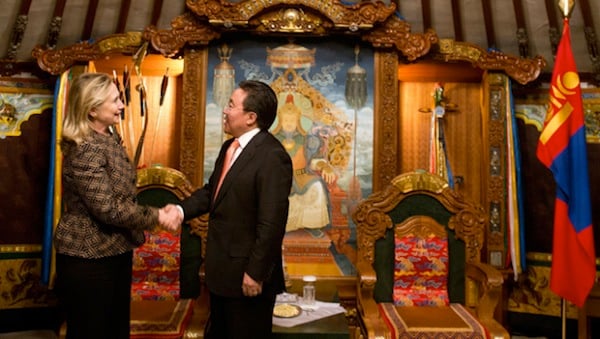
Secretary of State Hillary Clinton and Mongolian President Elbegdorj Tsakhia in Ulan Bator, Mongolia on July 9, 2012. Photo Credit: Getty
This week, the State Department held a “virtual ribbon cutting” for a new initiative, Leaders Engaged in New Democracies (LEND). LEND will help leaders in fledgling democracies connect with leaders who have experienced democratic transition in their own countries. As Voice of America reports, the initiative will facilitate conversations between leaders “by leveraging voice, video and text communication along with groundbreaking translation tools,” technology that can “address cost and logistical barriers to face-to-face meetings.” LEND is the result of collaboration between the U.S. and Estonia as part of the State Department’s Community of Democracies program, an initiative established in 2000 to “strengthen and deepen democratic norms and practices worldwide.” Among others, sponsors of LEND include the Club of Madrid (a group of former presidents and prime ministers who hail from democracies), Google, and the United States Agency for International Development (USAID).
Secretary of State Hillary Clinton gave remarks on LEND during her visit to Mongolia, a trip also notable for her plaudits of Mongolia’s democratic system. She described part of rationale behind LEND: “First, new democracies can and should learn from those that have already made the transition, overcome some of the obstacles, and have matured….Second, the pace of political change is accelerating and we have to try to keep up. That’s why we think leaders in emerging democracies can benefit from having access to immediate, on-demand information.” She also suggested that the private sector and civil society stand to play an important role in LEND.
So far media coverage of LEND is confined mostly to official press releases, but I think that it deserves more attention. While many of us interested in democratization and in international relations agree that it is vital for countries and leaders to learn from history, there are relatively few instances of leaders coming together in a systematic, practical way to do so. I’m also interested in how LEND will work–which leaders will be involved and what issues will they choose to discuss? How will they address the differences and similarities between their respective democracies? I look forward to following LEND as it progresses.